Themata
The first thing I see is a very old man staring at me. "You need to keep lying down for a little while longer."
"Where am I?" I ask. I look around and realize that I'm in a big room filled with a whole bunch of beds, all of which seem to be occupied. I have no memory of how I got here. My head is spinning.
"Someplace safe."
The old man pats me on my arm and then heads off to the next bed. As I watch him walk away, I try to recall that last thing I remember. I was at my desk looking over the Lock file. We're only in the Vision phase, but the set's really coming together. There's a mechanic I've been trying to get into Magic for years and it looks like this time it's finally going happen. My last memory is one of general contentment.
My attention turns to the bed I'm lying on. As I touch the mattress, it feels weird. It's not like any mattress I've ever experienced. It's conforming to my body, but I don't get the sense of any kind of springs. It must be one of those memory foam ones—although I've used them before and this feels different.
I then notice a metal band on my wrist. It's slightly warm to the touch. It perfectly fits my wrist yet doesn't have an obvious hinge or opening, making me curious how it got onto my wrist in the first place.
"Mark!"
I turn toward the voice. The person in the bed next to me is calling out. He knows my name. It must be someone I know. It takes a few seconds for my eyes to focus on the speaker. It's . . . me. A younger me. Mid-30s maybe. He's managed to sit up in his bed.
"Who are you?"
"You just called me Mark."
"I get who you're supposed to be. Who are you actually?"
"I'm you. But me."
"Can you prove you're you?"
"I guess. Ask me a question."
"When exactly was your daughter born?"
"Which one?"
"We have another daughter?"
"Yeah. We later have boy-girl twins."
"Twins?! Wow! That sounds kind of hard."
"It is, especially when they're babies."
"Babies? How old are they now?"
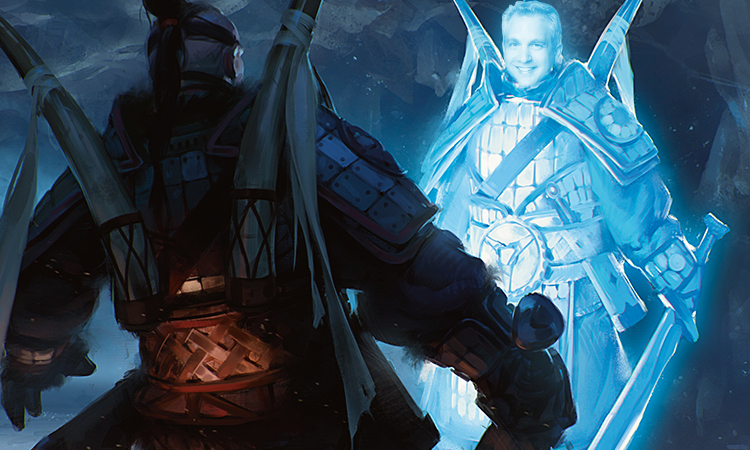
"Aren't we supposed to be proving we are who we say we are?"
"Right. When was Rachel born? Exactly."
"April 6. It was in the early afternoon. Between two and three. We went to the hospital in the middle of the night."
"What time exactly was she born?"
"Like 2:31. I think. I don't remember exactly. It was fourteen years ago."
"Rachel's fourteen?"
"She a freshman in high school."
"She was just born."
"That's why you remember the time. I do remember she weighted eight pounds, six ounces. I remember holding her in my arms in the operating room as I tried very hard to avoid seeing any of the blood. I proved I'm you. How do I know you're me?"
"Ask me anything?"
"Where did you propose to Lora?"
"In the ocean in Rio de Janeiro. We were there for the second Invitational."
"I wrote that in an article. I need more detail. What color was Lora's swimming suit?"
"Black."
"Okay, so we're actually who we say we are. If Rachel was recently born, you're 32."
"I'm 33; I just had my birthday. Our birthday. You're fourteen years older, so you're 47?"
"Yes."
"Should you be telling me things about our future? Every time-travel story I've seen or read says that's not a good idea."
"It doesn't matter. I have no memory of being here when I was you, so that means we're not keeping any memories from here. Wherever here is."
"I take it you haven't looked around yet."
"No. I'm still dizzy. I get there's a lot of beds."
"You might want to take a look."
I sit up and am hit by a bit of vertigo. I balance myself on my hands and let my eyes focus on the room. There are about fifteen beds and I'm in all of them. Different ages of me, of course. What the hell is going on?
I love puzzles. I mean we love puzzles, so all seventeen of us are interested in figuring out what's going on. The youngest of us is 29 and the oldest is 63. That's the first piece of the puzzle. Why aren't there child versions of me, or teen versions, or even mid-20s versions? Why start at 29? And then on the other side, I assume I live to be older than 63. Why stop at 63?
The other interesting thing is the ages skew toward the younger half. The halfway age is 46, yet only six of us are older than that. That has to mean something. Also, the old man who was attending to us earlier left before most of us got out of bed. He hasn't returned yet and the door is locked.
Speaking of the room, it's sparse. It seems more like some kind of storage room that's been cleaned out and filled with beds than a regular room. For example, there are no windows. The floor appears to be some kind of concrete composite. The walls are painted beige. This isn't a room intended for anyone to spend time in.
We spend half an hour focusing on the door, but the locking mechanism is beyond our reach to touch or see. There's a small dome on the ceiling that must be some kind of camera. We're obviously being watched.
For some reason, I'm the one to speak up. "We can solve this. We have a lot of clues. 29-year-old me, I think you're the key to figuring this out."
"Okay. Is there information I can give that will help?"
"Yes. What's the last thing you remember?"
"A bunch of us were down in Portland, working on the design of a new set. We were at Richard's house."
I look at the 29-year old. It hits me. He hasn't shaved for a few days. "You're working on Tempest!"
"What?"
"Um, what was the codename? Uh, Bogavhati. You're working on Bogavhati."
"Yes!"
"Okay, that's our first design lead. Our first design team, actually. 63-year old version of me, are you still doing Magic design?"
"I don't get to do the hands-on stuff as much as I once did, but yeah, I'm still working on Magic."
"That's it! That's it! Magic design! We represent the spectrum of us working on Magic design."
With this new information, we survey everyone to figure out what they're working on. It's strange. Not every set we designed is represented and a few of us even come from development teams rather than design teams. The 34-year old is helping out with Onslaught, but is on neither the design team nor the development team. To make things easier, we decide we need to give everyone names. As all seventeen of us are working on some Magic set, we choose to name ourselves after the codenames. We picked codenames over the actual name because no one working on the set (with a few exceptions) knows the actual name, and we felt it was unfair to give everyone a name they weren't familiar with.
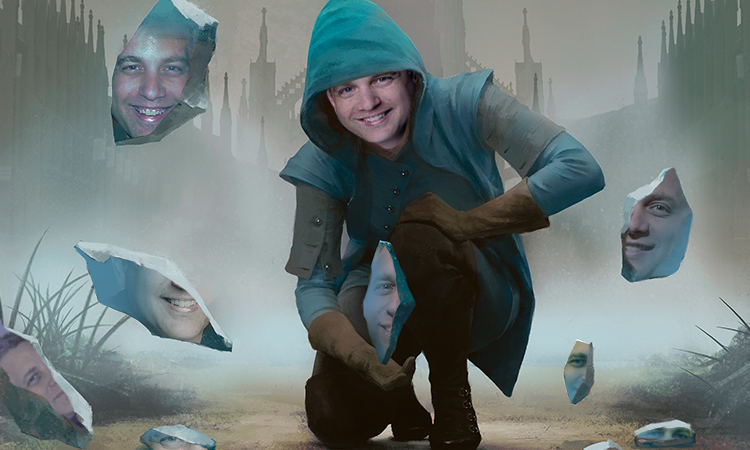
We decide the next step is to talk to Manny (the 34-year-old helping out with Onslaught), as he seems to be the outlier as someone not on a design or development team. Everyone decides it's easier to have a single person ask the questions, and as I had started, I'm picked to continue. "Okay Manny, tell us about what you were last working on."
"The set's been going through a lot of changes. I've been encouraging Mike Elliot, the set's designer, to try to up the amount that creature types matter. We're still missing a few mechanics, though. The rules team had this cool idea for a mechanic based on a ruling they made for Illusionary Mask that defines the stats of a facedown creature. Mike and Bill Rose weren't really interested, but I think it's pretty cool. I worked with the rules team to tweak a few things and then I made a bunch of cards that I put into two decks. I then started playing the decks with various members of R&D. The more people I get to play with, the more I'm managing to convince people that the mechanic is fun."
"And then?"
"I was tweaking the decks using the feedback from the last set of playtests, and next thing I knew, I woke up here."
"All right, Doughnut. Your turn to talk." Doughnut is 42 and working on Eventide. "What was the last thing you remember?"
"I attended the Morningtide Employee Prerelease. The set was fun, but it ended up being a bit much for some of the less enfranchised players. I saw a number of employees play one game and then pack it up and go. I even had a game where my opponent had me dead on the board and didn't see it for like eight turns."
"So Argon, tell us about the set you're working on?" It's Odyssey, my third lead design. Argon is 33.
"I'm doing a graveyard set. My goal has been to take the concept of card advantage and turn it on its ear. It's working. Strategically, the right move is often to throw away your entire hand, but I don't know, something seems off."
"Tell us about the set you're working on, Live." Live is 41 and working on the original Zendikar.
"I convinced everyone to let me do a 'lands matter' set. They were skeptical, but I was pretty confident that the design space was deep enough. The beginning of design was rough. Every lead we had turned out not to work and I was close to throwing in the towel. But then we found landfall and the whole set started to come together. I realized that landfall was lightning in a bottle, so I started studying it to figure out what makes it such a strong mechanic."
"How about I just call you Wacky rather than Wacky Set?" Wacky Set was the codename for Unglued, which I worked on when I was 30.
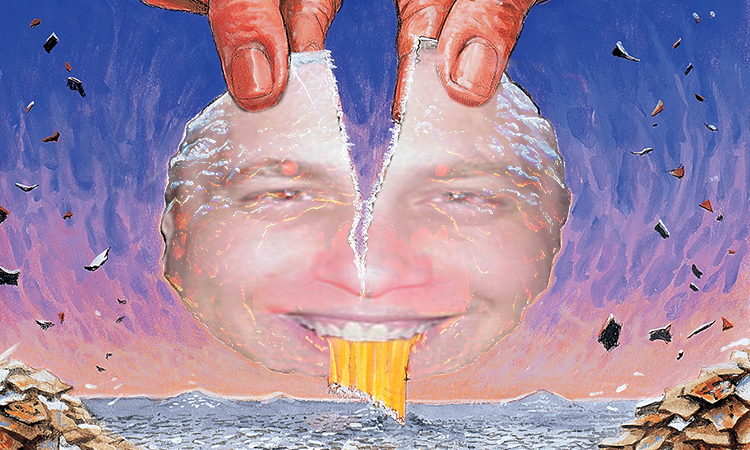
"No problem. We're pretty early in design. Bill and Joel Mick gave me an assignment to design a set with a special border that wasn't tournament legal. Other than that, it was up to me to figure out what that meant. I bounced around a lot of crazy ideas, but eventually I remembered this weird deck I owned back when I was a magician as a kid. The company made card decks for magic tricks. All the decks had the same card back. There was this one deck called something like the Wacky Deck and it just had a lot of individual weird cards. There was a three-and-a-half of clubs, an ace of hearts that was black, and a card that was a queen on one half and a king on the other half. The idea was that these were just a collection of weird cards that you could build magic tricks around. Then it hit me. What if the Wacky Set was that, but for Magic?"
"Control, you know what we want to hear." Control (the codename for original Ravnica) is 37.
"I'm working on a multicolor set. I needed to make it different than Invasion, our last multicolor block, so I decided to focus on two-color pairs rather than pushing toward four and five colors. Also to differentiate it from Invasion block, I decided to push all ten color pairs equally. Ally and enemy would be on equal footing in this block. I gave the idea to the creative team, and Brady Dommermuth came back with this neat idea of turning the ten color pairs into guilds in a city setting. I liked the idea so much, I decided to build the entire block plan around it. I have this idea for a 4-3-3 breakdown where each two-color combination only appears in one set. It's kind of weird, but I really think it will allow us to highlight each guild and give each set in the block a real identity."
"Your turn, Laurel." Laurel's the codename for a set in my future, so I don't know the real name for it. He's 59.
"We've messed around with double-faced cards forever, but the logistics of printing has always been a pain. So when we found out that one of our main printers finally cracked it, that we could have double-faced cards every set and we could consistently pair them up with other cards so we didn't have to use checklists, it was exciting. The goal of Laurel was to really take advantage of what this printing technology would allow, so when the team came up with—"
POP!
Laurel disappears. One second he is excitingly talking about his team's latest discovery and the next he literally vanishes. The assumption is he returned to his own time, but still it's a bit disconcerting. It's just not a sight you normally see.
We try to continue on with the questioning, but then Lights vanishes. Then Beijing. Then Spaghetti. Then Control. We haven't even figured out why we're here yet, and we've already begun vanishing.
One thing is clear as I hear everyone talk. There is a strong theme running through all the speeches. Each of us was in the middle of making a big discovery. Doughnut was figuring out New World Order. Control was beginning the Fourth Age of Design. Manny was in the middle of revolutionizing our "show don't tell" method of design exploration. Everybody was in the middle of something big. That is, everyone but myself. My design is going smoothly and I'm happy with it, but there's nothing revolutionary about it. I'm not reinventing how Magic is designed. I truly feel like I don't belong here.
When Simon vanishes, we're down to five of us: Argon, Shake, Salt, Chimichanga, and myself.
"Does any of this matter?" Shake says, "We know we're going to have no memory of this when we return to our own time, so maybe figuring it out doesn't matter."
"I know you've met us. You are us," Salt replies, "We can't walk away from a mystery. As long as we're here, we have to try."
I speak up. "I think there are three big questions remaining. First, why were the seventeen of us brought here? Second, where is 'here'? And third, who did this? I think we have an answer for the second and third questions."
I turn toward the camera.
"Where are we? That's the wrong question, actually. The real question is when are we? We're in the future. 2060, 2070. Sometime around there. Obviously we were brought through time, so it had to be beyond the oldest version of us from 2030. Also, we had one other big clue, which leads us to the next question. Who brought us here? I believe the answer is the man watching us right now. The man who attended to us when we first arrived. That man . . . is us!"
Nobody gasps because I think we had all figured it out, but I couldn't resist the dramatic moment.
The door opens and the old man enters. "You've done well. The year is 2067. I am exactly one hundred years old, but then you all know our birthday. Have you figured out the first question yet?"
"No," Salt replies, a second before he vanishes.
"We don't have a lot of time, so I guess we better get to it."
The old man brings us out of the room and into what appears to be the control center. Any doubt that we were in the future goes away as we see all the equipment. Each of us is being tracked with more data than we could probably make any sense of. My guess is the bands on our wrists are responsible for recording everything.
"Sit, sit. We don't have much time." Chimichanga vanishes and the old man shakes his head. Shake, Argon, and I each take a seat.
"Late in life, I became very obsessed with Albert Einstein. I started studying his work and ended up learning all about his life. When he was four, he got sick and was restricted to bed. His father, trying to make him feel better, gave him a small gift: a magnetic pocket compass. Einstein was fascinated by it. The idea that there was some force that kept the needle always pointing north made a deep impression on him, and he would later claim that many of his scientific discoveries could be traced back to the thoughts he had while staring at the compass. That's what's known as a themata. A series of patterns that shapes how a person thinks."
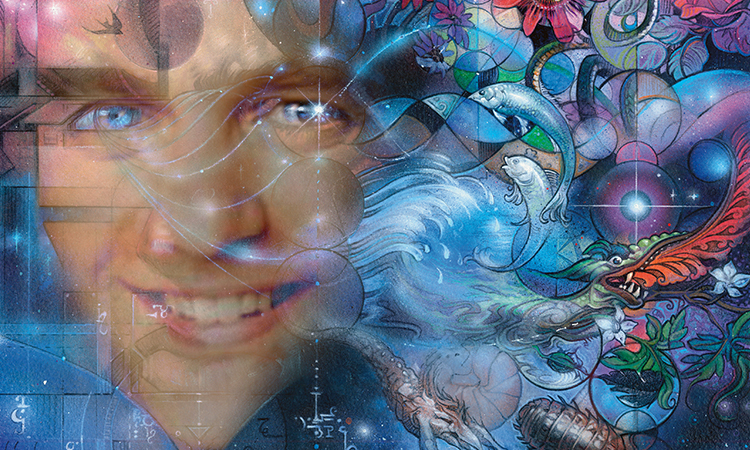
"What does that have to do with anything?" Argon asks.
"Everything," the old man replies. "I watched you all as you talked. What did you learn?"
Shake speaks up. "You clearly plucked us from times of discovery."
"Very good. And that means?"
"Oh," I say, "We're the themata. You gathered all the major discoveries you made about Magic design and brought us here. But why?"
"Magic's in trouble. Next year is its 75th anniversary, and the plan is for it to be the game's final year. A bunch of us old-timers, the humans that used to do the design back in the day, are trying to see if we can fix the problem. The AIs have given up. They claim it's unsolvable."
"Why do you need us?" Shake asks.
"We're a bunch of old people. None of us have done Magic design for decades. We'd come to accept that we don't have the capacity to solve the problem, but then we realized that perhaps one of us once did. Maybe the secret to saving Magic rests in a solution that one of us already made. So we used memory scanners to isolate all our discoveries, all the mental patterns that led us to making big leaps in how we changed the game. Each one of us then used some new technology from a scientist, a long-time Magic player, to bring all of our past selves here."
"I don't understand how that helps," I reply.
"It's kind of complex. We have computers processing your, let's call it your current mental footprint, to match it against potential solutions to our problem. The computers can tell when there is a high correlation between your current mental state and our solution, but the actual solution is invisible to them. In other words, they can tell who can solve the problem but not how."
"And why are we disappearing?" Shake asks.
"Oh, the energy required to temporally keep you anchored to this time is limited. To increase our chances of finding the right person, when the computers discovers the correlation is low enough they release you back to your own time to allow us to conserve the energy for the candidates with a higher chance of success."
"So you're eliminating people until you find the best shot at a solution?" I ask.
"Exactly. And you three are our last chance. I'd worked on Magic the longest, so I had the most possible candidates. The computers have eliminated everyone else."
The three of us sit and talk with the old man. Argon talks about how he had learned (in Odyssey) the importance of designing for the player and not for the designer. That changing things for the sake of change was bad and led to gameplay that forced the players to do things that they didn't want to do. Shake talks about how he had learned (in Innistrad) the importance of finding the right balance between mechanics and flavor. That each environment had its own feel and we had to learn to not apply old structure simply because it's how we had designed sets previously.
I try to talk about the design of Lock. I'm really happy with it and I think we're making a really fun set that the players are going to love, but I can't see what we're doing that's revolutionizing how we design sets. I can't see the discovery. I'm kind of shocked that I haven't yet already vanished, which makes me feel even worse when Argon disappears.
"You've told us there's only a limited amount of energy to keep us here," I say, "Why don't you send me home to give Shake the maximal amount of time to help you?"
"I don't know yet that you're not the one we need."
"I know. I've been wracking my brains. I don't even know why I'm here. How can I help you when I don't even know what it is I've discovered?"
Shake then vanishes.
"I hope you're wrong, as you're now our last hope."
I convince the old man to let me go outside. I need to clear my head and I think the fresh air will help. He finds me staring out at the sea.
"I wish I remembered," he says.
I turn to see the old man next to me.
"It was over 50 years ago. Whatever lesson you've learned is ancient history for me."
"How much time do we have left?"
"Not a lot."
"I want to help. I owe Magic a lot. It led to the best things of my life. I don't want to see it die, but I don't know what it is I know that's going to help you."
"If you were brought here, that means you've already made the discovery. Maybe you haven't processed it yet, but whatever needed to happen to generate the discovery has already happened. We just have to figure out what that is."
"Okay. How do we do that?"
"Maybe this isn't about Lock. I might not remember the details, but I know we had a lot of balls in the air back in the day. What else are you working on?"
"I'm on the design team for both Tears and Sweat. We're doing exploratory design on Barrel. I'm part of the team consulting on the Magic movie. I've got various PR responsibilities. I have my articles and my podcast and my blog and my comic and the rest of my social media. I've thought about all of those. Nothing."
"How about projects you've finished that aren't out the door yet?"
"I handed off Blood back in June. That's the return to Zendikar. It's in development now."
"Have you given any thought to that?"
"I'm not doing much on it. I check in from time to time with Erik."
"And?"
"And he's doing a great job. I gave him a really rough design file. We switched to the Two-Block Paradigm mid-design and it caused me all sorts of headaches."
"This discovery had to be relatively recent. Have you discussed the file with Erik in the last week or so?"
"I did a playtest Monday."
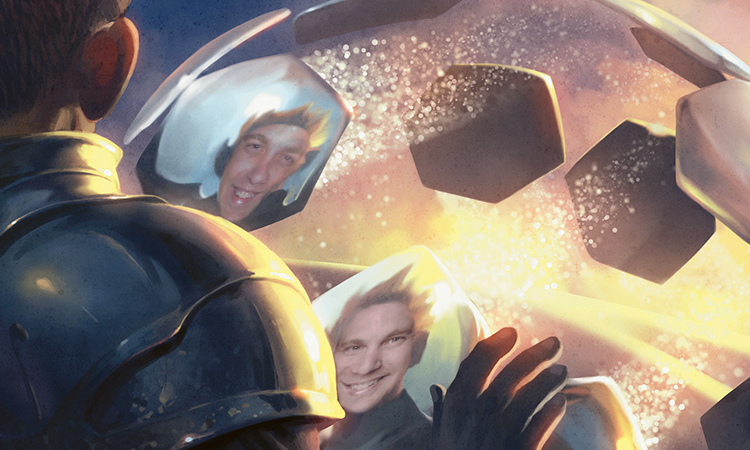
"What happened?"
"It was good. Erik's messing around with a new mechanic for the Eldrazi. They eat things out of the exile zone."
"Did you like it?"
"It played well. The one issue I had was Erik wants to let people put the 'eaten' exiled cards in their owner's graveyard instead of removing them from the game."
"What's the problem?"
"I've just had a long quest to keep the exile zone from becoming a second graveyard, so I've been very vigilant about letting things bring cards exiled by something else back into the game. I basically have a standing rule that says nothing can bring cards back from exile except the card that put it there."
"So what did you tell Erik?"
"Erik was worried that having to create a brand new zone just to put the cards removed from exile was clunky and that the graveyard logistically made it cleaner. I did a little soul searching. I re-examined why exactly I was so dead-set against things returning from exile. I realized that my actual issue was that I needed exiling things to be a real cost that the game didn't let you easily undo. That when something is exiled, there aren't ways for you to just bring it back. Only being able to return the opponent's exiled cards didn't let that happen. Yes, a card can come back, but it's because an opponent weighed the cost and allowed it to happen—and even then it goes back to the graveyard, which is harder to access."
"So you went back on an unbreakable rule you'd made for yourself?"
"I realized that the game is all about new discovery, and if our goal is to keep exploring new design space that I have to be willing to re-evaluate old decisions. I don't have the luxury of absolutes. Good design means no previous design rules are off limits from re-examination."
The old man and I look at each other and smile.
"That's it. That's why the AI can't solve this. It's unwilling to break old rules. There must be some old design space we've made off limits that we can carve new design space out of. We've forgotten that Magic is the game that breaks its own rules."
I don't know if you've ever been hugged by a 50-year-old version of yourself, but it's surprisingly pleasant. I know that any minute I am going to be returning to my own time and that I won't remember any of this, so I allow myself a moment to enjoy it.
The last thing I see is a very old man staring at me with a tear in his eye.
"Drive to Work #272—ARC System"
Long ago, Wizards of the Coast tried a radical idea to expand trading card games to a mass audience. It failed. Today's podcast is the story of that product.
"Drive to Work #273—Fate Reforged, Part 1"
This is part one of a five-part series on the design of Fate Reforged.
- Episode 273 Fate Reforged, Part 1 (21.6 MB)
- Episode 272 ARC System (17.9 MB)
- Episode 271 Un-Rules Manager (16.7 MB)
- Episode 270 10 Things Every Game Needs: Flavor (15.4 MB)
- Episode 269 Breaking Rules (15.1 MB)
Work for Wizards of the Coast
From time to time, I use my column to let you all know about job opportunities here at Wizards to work on Magic. Today's job is connected to those cool trailers videos we make for upcoming sets. Below you can see the latest one from Battle for Zendikar.
Are you interested in helping us make cool things like the video above? If so, you might be in luck. We are currently looking for a new Art Director. Check out the link below to see if you might be a good fit.
The full job description and application can be found here.

